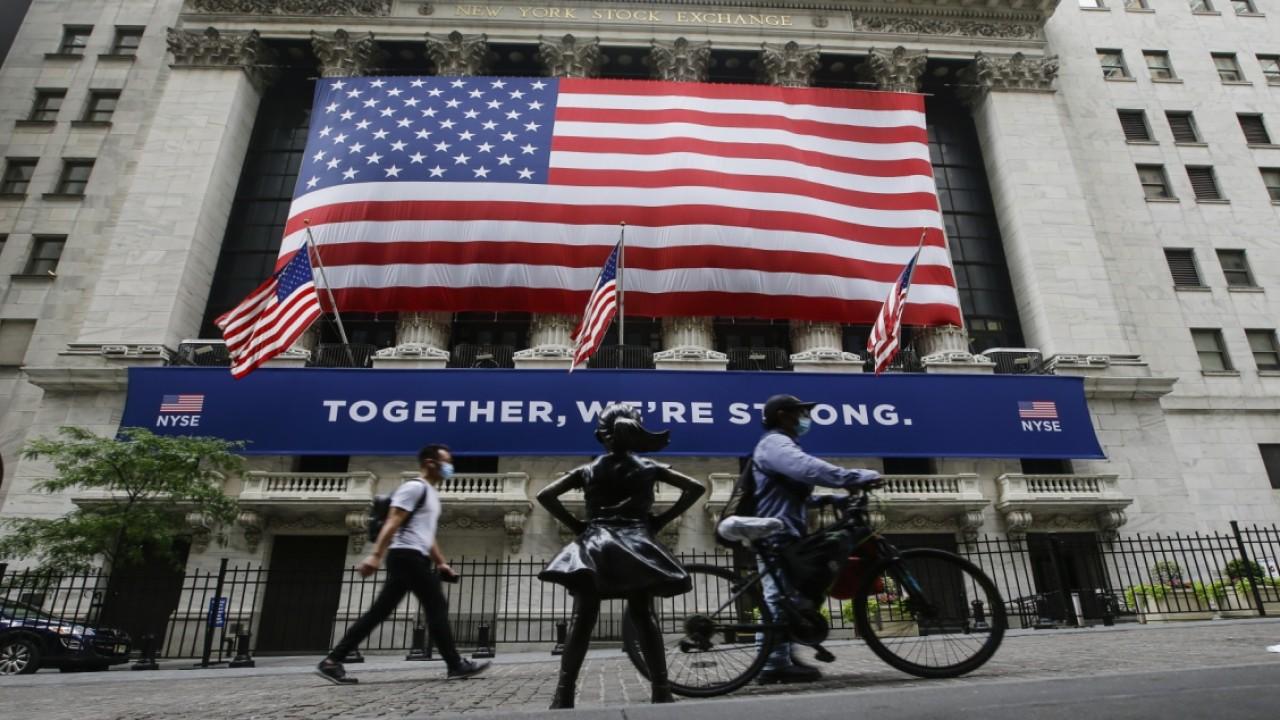US stock futures slip, starting week on muted note
Futures tied to the S&P 500 index ticked down 0.1%
U.S. stock futures edged lower Monday, suggesting the week may start on a muted note as attention focuses on businesses' dimming outlook and the hurdles facing fresh stimulus packages as rising coronavirus infection levels threaten to stall the economic recovery.
Futures tied to the S&P 500 index ticked down 0.1%, following a week in which the gauge for major American stocks posted modest gains. The pan-continental Stoxx Europe 600 wavered between gains and losses. In Asia, Chinese stocks rallied, while other markets posted more tepid moves by the close of trading.
GET FOX BUSINESS ON THE GO BY CLICKING HERE
More than 140,300 people in the U.S. have died from the coronavirus pandemic, with the number of infected Americans continuing to climb over the weekend. Investors and economists are increasingly taking the view that any robust recovery in the global economy, which suffered a severe contraction in the three months through June, will depend on authorities' success in containing fresh outbreaks.
"You can't have case numbers and economic activity rising at the same time. Something has to give," said Seema Shah, chief strategist at Principal Global Investors. "We've shifted to a point where the market might take a regional lockdown in the U.S. as a positive sign, because it would be seen that officials are taking it seriously."
OIL FALLS ON WORRIES OVER FUEL DEMAND SETBACK AS CORONAVIRUS INFECTIONS RISE
Investors expect to get more visibility into the health and prospects of major American businesses as Coca-Cola, Lockheed Martin, United Airlines Holdings and others report earnings this week and offer their perspectives on operations for the rest of the year. The 500 largest public companies in the U.S. are projected to report a 44% drop in earnings for the second quarter when widespread lockdown orders ended a decadelong economic boom, according to analysts polled by FactSet.
Executives across major industries including travel and leisure who were bracing for a monthslong disruption are now thinking in terms of years, as the resurgence of the virus in many states dashes hopes for a quick recovery. They are turning furloughs into permanent layoffs, de-emphasizing their core businesses and downsizing production indefinitely.
GM'S MARY BARRA SEES 'RELATIVELY SHORT-LIVED' CORONAVIRUS RECESSION, WITH RECOVERY BY EARLY 2021
Technology company IBM is expected to report earnings Monday after the closing bell in New York.
Attention is also shifting to the prospects of more stimulus measures to bolster the economy in both the U.S. and Europe. Roughly 25 million Americans are set to lose $600 a week each in federal unemployment benefits at the end of the month, which could derail the revival in consumer spending. That's one of the thorniest issues Congress faces when it returns to Washington this week to consider another coronavirus relief bill. Lawmakers will have just weeks to craft new deals to aid families and businesses.
"If we get some positive news on the U.S. stimulus this week, there is more room to rally for risk assets," said Jane Foley, head of foreign exchange strategy at Rabobank. "But until we see better news on the coronavirus front, the stock market may be looking a bit toppy."
In Europe, negotiations among leaders for a highly anticipated recovery plan worth EUR1.8 trillion ($2.06 trillion) dragged into a fourth day on Monday, leading to tense exchanges and fears of a breakdown. European Union officials didn't nail down the size of the final plan over the weekend, or determine how much of it should be available in grants and what conditions need to be attached.
Failure to reach a deal by the end of the month would disappoint investors, though few expect an agreement to be hammered out this week. The euro edged up 0.3% against the dollar.
"Leaders are under pressure to deliver now," said Florian Hense, European economist at Berenberg bank. "It's crucial to have a constructive tone and to arrive at some kind of agreement before the summer break."
The structure of the aid package is almost as important as its timing, investors and analysts said. The divide between grants and loans will be key for already debt-laden countries such as Italy. Investors bought up Italian bonds, sending the yield on 10-year government debt down by 2.5 basis points to 1.151%, signaled an uptick in their risk appetite.
CLICK HERE TO READ MORE ON FOX BUSINESS
"If there's a much smaller grant component than expected, then that will disappoint the market," Ms. Shah said.
In China, the Shanghai Composite Index rose 3.1%, led by jumps in shares of the country's big insurers. Late on Friday, China's banking and insurance regulator said it would allow domestic insurers to allocate up to 45% of their total assets to equity investments, from 30% previously.
That could potentially channel as much as 530 billion yuan ($75.8 billion) into China's stock market in the next three years, Tianfeng Securities, a domestic brokerage, estimated in a research note. Money managers said the regulatory change was seen as a bullish long-term signal for the market broadly, and could also improve insurers' profitability.
Stock benchmarks in South Korea and Hong Kong edged lower by the close of trading, while Japan's Nikkei 225 gauge ticked higher.
In bond markets, the yield on the 10-year U.S. Treasury eased down to 0.617%, from 0.628% Friday.
In commodities, Brent crude, the international oil benchmark, fell 1% to $42.68 a barrel.
--Xie Yu contributed to this article.
Write to Anna Isaac at anna.isaac@wsj.com




















